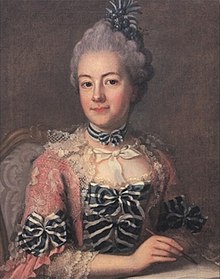Feminism in Sweden
Since the publication Samtal emellan Argi Skugga och en obekant Fruentimbers Skugga by Margareta Momma in 1738, followed by Hedvig Charlotta Nordenflycht's famous poem Fruntimrens försvar (To the Defense of Women, 1761) debate on gender roles and gender equality has become a mainstream topic.
With a relatively high level of education, in 1862, unmarried Swedish women were the first worldwide to be granted conditional right to vote in municipal elections.
Since then, Sweden has remained a forerunner of gender equality driven by a both intellectual and practical feminist movement.
Many anonymous female journalists and writers participated under pseudonyms in temporary periodicals, often in the form of a fictions correspondence, questioning the status of women, only a minority of whom, however, has been identified.
In 1761, Hedvig Charlotta Nordenflycht wrote her famous poem Fruntimrens försvar (To the Defense of Women).
In 1848, Sophie Sager aroused considerable controversy after reporting a rape attempt and going on to win her case.
She became the perhaps first woman in Sweden to make public speeches in favor of feminism, which made her famous but also ridiculed as a feminist figure.
In 1859, the first women's magazine in Sweden and the Nordic countries, the Tidskrift för hemmet, was founded by Sophie Adlersparre and Rosalie Olivecrona.
The organized women's movement begun in 1873, when the Married Woman's Property Rights Association was co-founded by Anna Hierta-Retzius and Ellen Anckarsvärd.
Women organized prominently in the Woman's Christian Temperance Union, whose Swedish section Vita bandet ("White ribbon") was founded in 1897.
In 1902 the Swedish Society for Woman Suffrage was founded, supported by the Social Democratic women's Clubs.
Between 1921 and 1971, the successor of the suffrage movement, the Svenska Kvinnors Medborgarförbund, worked to ensure that the formal laws of gender equality was enforced in practice and not remain on paper only.
[12] During the 1960s- and 1970s, Sweden experienced a new wave of feminism: in 1968, the Group 8 was founded and raised a number of issues within gender equality.
During the 2000s, it led to feminist campaigns such as Bara Bröst and Dirty Diaries, as well as anti-feminist reactions such as The Gender War.
In 2005, the Feminist Initiative was founded as a political force, centered around Gudrun Schyman, who has since the 1990s been a leading figure within Swedish feminism.
In 2017 Maria Teresa Rivera became the first woman in the world granted asylum because of being wrongly jailed for disregarding a ban on abortion.
[16] While there are no legal quotas for female candidates in Sweden, most parties have internal policies to promote the participation of women.
However, the law is politically constructed, discussed, and enforced in the context of men buying sex from women.
[29] The Feminist Foreign Policy is structured around Rights, Representation and Resources and based on the different Realities in which women live.
Their rights' approach is based on a number of international frameworks including: A survey from 2017 shows that there are only 17 women who are heads of state globally.
This is why Representation is another focus point for the Swedish Government, promoting women's participation and influence in all decision-making processes on all levels and areas.



